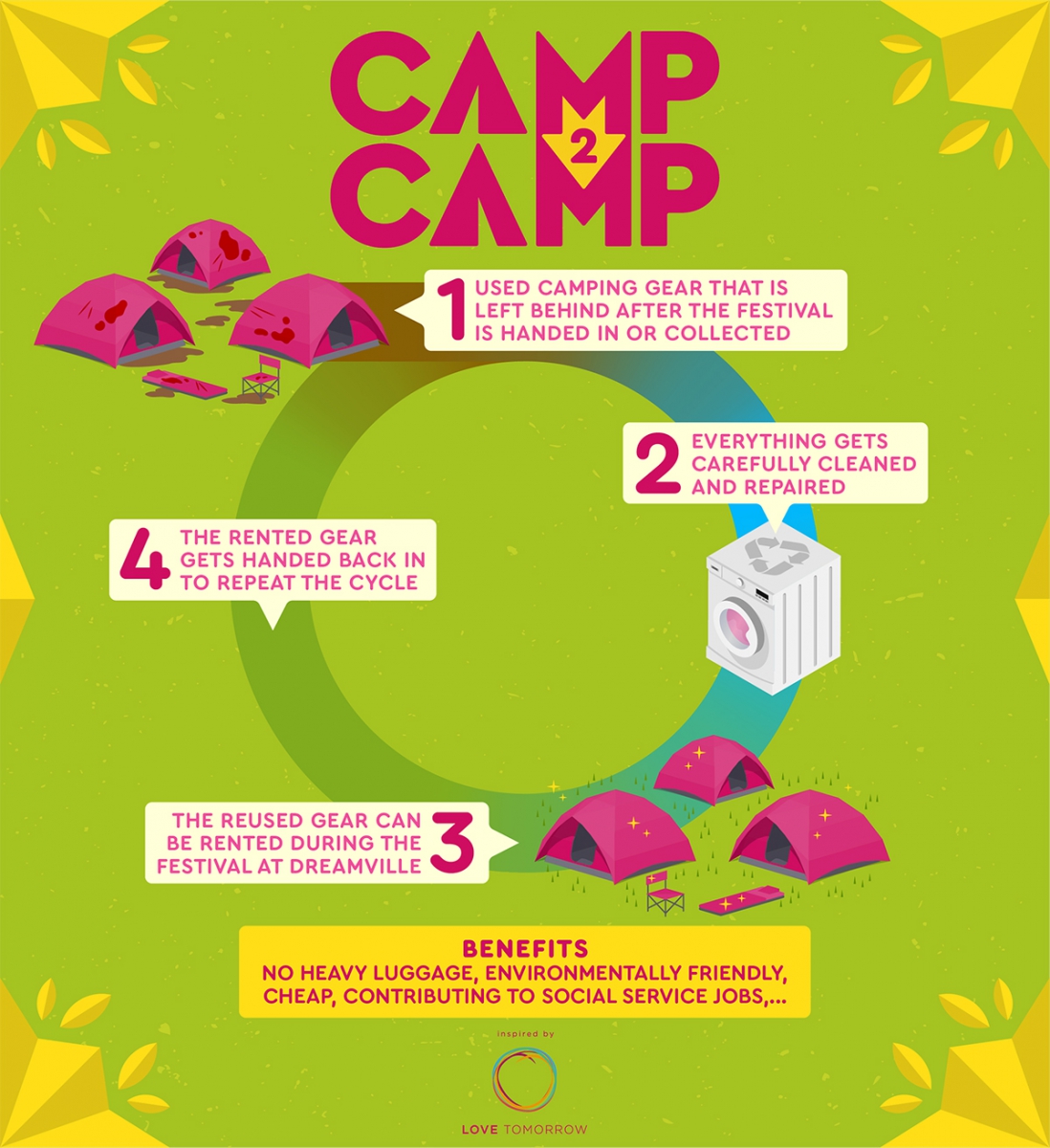Topics
We organise our actions in six thematic & strategic agendas:
Strategic Agendas:
Bio-economy
Circular Construction
Chemicals/Plastics
Manufacturing Industry
Food Chain
Water Cycles
Seven leverages provide additional support:
Leverage effects:
Lever Policy Instruments
Lever Circular Procurement
Lever Communication
Lever Innovation & Entrepreneurship
Lever Financing
Lever Jobs & Skills
Lever Research
What, why and how?
Why are we pursuing a circular economy?
Future visions 2050
How do we see our circular future?
About our management
Who steers what at Flanders Circular?
CAMP2CAMP
A second life for festival tents
A huge amount of camping equipment is lost on festival camp sites around the world: it is left behind in almost new condition, it is completely destroyed or something in between. Camping at festivals is therefore an outgrowth of the linear organisation of our economy. This way of dealing with raw materials is particularly harmful to the environment, but the social impact is also large: the low production prices are often coupled with scarce paid labour in developing countries.
With the CAMP2CAMP project, Love Tomorrow, in cooperation with Kringwinkel Ecoso, wants to contribute to a more circular way of camping.
The aim is twofold. On the one hand, we want to minimise the environmental impact of festival camping by focusing on prevention and awareness, reuse and recycling and through product and system innovations. On the other hand, we want to create social added value, both through social activation and by using camping materials for social purposes. For example, we want to promote social inclusion by offering camping equipment to certain social target groups or by shifting production in low-wage countries to regional target group employees.

Love Tomorrow (WEAREONE.world bvba)
Partners Ecoso vzw
Sectors
Themes
Organisations
MOST IMPORTANT
RESULTS
- Thanks to various collection actions on festival campsites, we have already collected 143 tonnes of camping equipment that no longer automatically ends up in the incinerator, but is recycled or given a new destination.
- To avoid that more material is left behind under the pretext of 'it goes to a good cause', we focus on active communication and awareness among campers, so that material is taken back (and reused) in the first place.
- We focus on social activation: we have already created 7.2 FTEs for target group employees, work with volunteers from social organisations, refugees from an asylum centre, etc. and we have already inspired partners to undertake similar initiatives.
- After this instructive journey, we are ready to form our own entity and establish an international non-profit organisation. This will make our operations more transparent, facilitate cooperation with partners and open doors for new collaborations.
MOST IMPORTANT
LESSONS LEARNED
- We cannot let our collection campaigns run indefinitely, because our stock is gradually becoming too large to be able to reallocate. The collected material is also often of low quality. We would do better to shift our focus to more sustainable product design.
- Pre-communication is essential to raise awareness among campers. At the festival itself, the message is often lost in the midst of all the other stimuli and impressions. That is why festival visitors now receive an e-mail in advance with tips and tricks on how to use camping equipment more sustainably.
- It is not easy to set up a smooth volunteer operation, but we have already taken important steps forward. We doubled our number of volunteers by choosing to recruit from social organisations (instead of youth movements). This does create an extra challenge in terms of coordination.
- Processing the collected items into a stock of perfectly cleaned material ready for rental is no easy task. More efficiency is needed here, both in terms of quality and hygiene and to get the high numbers ready for use in an affordable way.
WHAT DOES
THE FUTURE HOLD?
Compared to our initial idea, this project has received much more attention than expected. More and more people believe in our mission, more partners come forward, we have more income, but also more expenses... Enough reasons to continue this project in the future and to investigate how we can make CAMP2CAMP profitable.
So we have thoroughly evaluated our different activities to decide what our focus should be in the future. For example, we can better shift our focus from fundraising to our own product design in order to continue to offer quality and to really make a difference. At the same time, we need to focus even more on awareness raising to reduce the need for fundraising.
Although our goal is to eventually become self-sufficient, more financial support will be needed for product innovation, as well as for financing the learning and orientation programmes.
To ensure our continued existence, it is also important that we form a separate organisation or entity. This will ensure more transparency and clarity, a smoother way of cooperating with our partners and will open the door to collaborations with other festivals. We have discovered that a non-profit organisation is the most suitable for our current activities, but then one with international allure.
















